- Page 1 and 2:
ORGANISATION FOR ECONOMIC CO-OPERAT
- Page 3 and 4:
ORGANISATION FOR ECONOMIC CO-OPERAT
- Page 5 and 6:
Evaluating Country Programmes 4 The
- Page 7 and 8:
Evaluating Country Programmes 6 SDC
- Page 9 and 10:
OECD 1999 Glossary of Acronyms and
- Page 11 and 12:
Introduction OECD 1999 Chapter 1 Co
- Page 13 and 14:
Rationale, purpose and use OECD 199
- Page 15 and 16:
OECD 1999 Country Programme Evaluat
- Page 17 and 18:
OECD 1999 Country Programme Evaluat
- Page 19 and 20:
OECD 1999 Country Programme Evaluat
- Page 21 and 22:
DONOR INFLUENCES Evaluation skills
- Page 23 and 24:
OECD 1999 Country Programme Evaluat
- Page 25 and 26:
OECD 1999 Country Programme Evaluat
- Page 27 and 28:
OECD 1999 Country Programme Evaluat
- Page 29 and 30:
OECD 1999 Country Programme Evaluat
- Page 31 and 32:
OECD 1999 Country Programme Evaluat
- Page 33 and 34:
OECD 1999 Country Programme Evaluat
- Page 35 and 36:
OECD 1999 Country Programme Evaluat
- Page 37 and 38:
OECD 1999 Country Programme Evaluat
- Page 39 and 40:
OECD 1999 Country Programme Evaluat
- Page 41 and 42:
13.00-14.30 Lunch break 14.30-15.30
- Page 43 and 44:
OECD 1999 Country Programme Evaluat
- Page 45 and 46:
OECD 1999 FINLANDE/FINLAND Ms. Eeva
- Page 47 and 48:
OECD 1999 PORTUGAL Mr. Mario Mendes
- Page 49 and 50:
Mr. Wolfgang GRUBER Director, Proje
- Page 51 and 52:
OECD 1999 Country Programme Evaluat
- Page 53 and 54:
Evaluating Country Programmes 54 It
- Page 55 and 56:
OECD 1999 56 Mali . . . . . . . . .
- Page 57 and 58:
Evaluating Country Programmes 58 -
- Page 59 and 60:
Evaluating Country Programmes 60 po
- Page 61 and 62:
Evaluating Country Programmes 62 Bo
- Page 63 and 64:
Evaluating Country Programmes 64 -
- Page 65 and 66:
Evaluating Country Programmes 66 In
- Page 67 and 68:
Evaluating Country Programmes 68 Ti
- Page 69 and 70:
Evaluating Country Programmes 70 Bo
- Page 71 and 72:
Evaluating Country Programmes 72 Re
- Page 73 and 74:
Evaluating Country Programmes 74 pe
- Page 75 and 76:
Evaluating Country Programmes 76 va
- Page 77 and 78:
Evaluating Country Programmes 78 (e
- Page 79 and 80:
Evaluating Country Programmes 80 Th
- Page 81 and 82:
Evaluating Country Programmes 82 ou
- Page 83 and 84:
Evaluating Country Programmes 84 Wi
- Page 85 and 86:
Evaluating Country Programmes 86 Bo
- Page 87 and 88:
Evaluating Country Programmes 88 Ap
- Page 89 and 90:
OECD 1999 Appendix 2.3 Complete Lis
- Page 91 and 92:
OECD 1999 93 Complete list of known
- Page 93 and 94:
OECD 1999 95 Complete list of known
- Page 95 and 96:
OECD 1999 The CPE review instrument
- Page 97 and 98:
OECD 1999 Appendix 2.5 List of Dono
- Page 99 and 100:
OECD 1999 Country Programme Evaluat
- Page 101 and 102:
OECD 1999 Checklist of questions (c
- Page 103 and 104:
Country programme evaluations - See
- Page 105 and 106:
Summary OECD 1999 Chapter 3 Country
- Page 107 and 108:
Background OECD 1999 CPE in the Net
- Page 109 and 110:
CPE in the Netherland’s Developme
- Page 111 and 112:
OECD 1999 CPE in the Netherland’s
- Page 113 and 114:
OECD 1999 CPE in the Netherland’s
- Page 115 and 116:
Methodology OECD 1999 CPE in the Ne
- Page 117 and 118:
OECD 1999 CPE in the Netherland’s
- Page 119 and 120:
OECD 1999 CPE in the Netherland’s
- Page 121 and 122:
Evaluating Country Programmes 124 P
- Page 123 and 124:
Evaluating Country Programmes 126 G
- Page 125 and 126:
Evaluating Country Programmes 128 R
- Page 127 and 128:
Evaluating Country Programmes 130 3
- Page 129 and 130:
Evaluating Country Programmes 132 P
- Page 131 and 132:
Evaluating Country Programmes 134 Y
- Page 133 and 134:
Evaluating Country Programmes 136 N
- Page 135 and 136:
Evaluating Country Programmes 138 O
- Page 137 and 138:
Evaluating Country Programmes 140 p
- Page 139 and 140:
Evaluating Country Programmes 142 R
- Page 141 and 142:
Chapter 5 Country Assistance Evalua
- Page 143 and 144:
Country Assistance Evaluation in th
- Page 145 and 146:
OECD 1999 Country Assistance Evalua
- Page 147 and 148:
OECD 1999 Country Assistance Evalua
- Page 149 and 150:
OECD 1999 Country Assistance Evalua
- Page 151 and 152:
OECD 1999 Country Assistance Evalua
- Page 153 and 154:
Traditional tools: relevance, effic
- Page 155 and 156:
Measuring sustainability OECD 1999
- Page 157 and 158:
OECD 1999 Country Assistance Evalua
- Page 159 and 160:
Rating country strategies and assis
- Page 161 and 162:
OECD 1999 Country Assistance Evalua
- Page 163 and 164:
OECD 1999 Country Assistance Evalua
- Page 165 and 166:
OECD 1999 Country Assistance Evalua
- Page 167 and 168:
OECD 1999 Country Assistance Evalua
- Page 169 and 170:
OECD 1999 Chapter 6 French Experien
- Page 171 and 172:
OECD 1999 French Experience with Co
- Page 173 and 174:
OECD 1999 French Experience with Co
- Page 175 and 176: French Experience with Country Prog
- Page 177 and 178: OECD 1999 Chapter 7 Issues for Coun
- Page 179 and 180: Issues for Country Evaluation: The
- Page 181 and 182: Issues for Country Evaluation: The
- Page 183 and 184: OECD 1999 Issues for Country Evalua
- Page 185 and 186: Introduction OECD 1999 Chapter 8 Co
- Page 187 and 188: OECD 1999 Country Assistance Strate
- Page 189 and 190: OECD 1999 Country Assistance Strate
- Page 191 and 192: Country Assistance Strategies as a
- Page 193 and 194: OECD 1999 Country Assistance Strate
- Page 195 and 196: OECD 1999 Country Assistance Strate
- Page 197 and 198: OECD 1999 Country Assistance Strate
- Page 199 and 200: OECD 1999 Country Assistance Strate
- Page 201 and 202: OECD 1999 Country Assistance Strate
- Page 203 and 204: Introduction OECD 1999 Chapter 9 Th
- Page 205 and 206: OECD 1999 Country Assistance Evalua
- Page 207 and 208: OECD 1999 Country Assistance Evalua
- Page 209 and 210: OECD 1999 Country Assistance Evalua
- Page 211 and 212: Executive summary OECD 1999 Chapter
- Page 213 and 214: OECD 1999 Country Programme Plannin
- Page 215 and 216: OECD 1999 Country Programme Plannin
- Page 217 and 218: OECD 1999 Country Programme Plannin
- Page 219 and 220: OECD 1999 Country Programme Plannin
- Page 221 and 222: OECD 1999 Country Programme Plannin
- Page 223 and 224: OECD 1999 Country Programme Plannin
- Page 225: OECD 1999 Country Programme Plannin
- Page 229 and 230: Real Progress: Fifty Years of USAID
- Page 231 and 232: Real Progress: Fifty Years of USAID
- Page 233 and 234: OECD 1999 Real Progress: Fifty Year
- Page 235 and 236: OECD 1999 Real Progress: Fifty Year
- Page 237 and 238: Real Progress: Fifty Years of USAID
- Page 239 and 240: OECD 1999 Real Progress: Fifty Year
- Page 241 and 242: OECD 1999 Real Progress: Fifty Year
- Page 243 and 244: OECD 1999 Real Progress: Fifty Year
- Page 245 and 246: OECD 1999 Real Progress: Fifty Year
- Page 247 and 248: OECD 1999 Real Progress: Fifty Year
- Page 249 and 250: Assessment OECD 1999 Real Progress:
- Page 251 and 252: Real Progress: Fifty Years of USAID
- Page 253 and 254: Real Progress: Fifty Years of USAID
- Page 255 and 256: Sectoral successes: activities with
- Page 257 and 258: Evaluation of macro-level performan
- Page 259 and 260: Real Progress: Fifty Years of USAID
- Page 261 and 262: OECD 1999 Real Progress: Fifty Year
- Page 263 and 264: OECD 1999 Real Progress: Fifty Year
- Page 265 and 266: OECD 1999 Real Progress: Fifty Year
- Page 267 and 268: OECD 1999 Real Progress: Fifty Year
- Page 269 and 270: OECD 1999 Appendix 11.1 Sectoral an
- Page 271 and 272: OECD 1999 Bibliography Real Progres






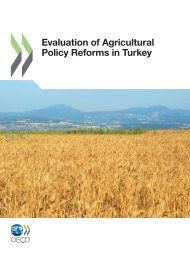
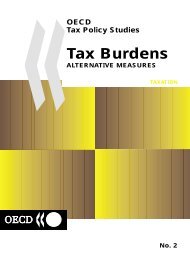
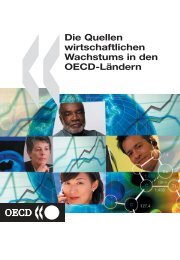




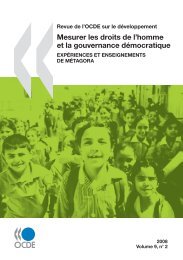
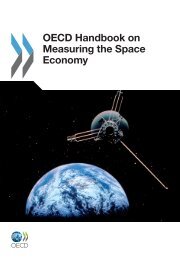
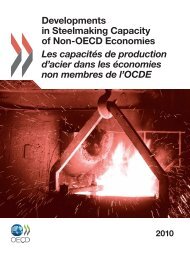

![CQE=U]^\]Z: KAZAKHSTAN - OECD Online Bookshop](https://img.yumpu.com/3915768/1/190x253/cqeuz-kazakhstan-oecd-online-bookshop.jpg?quality=85)